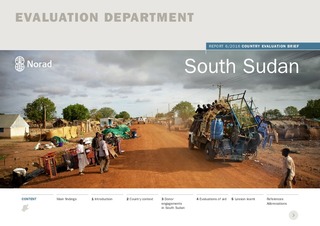Country Evaluation Brief: South Sudan
Research report
Permanent lenke
http://hdl.handle.net/11250/2475286Utgivelsesdato
2016-11-01Metadata
Vis full innførselSamlinger
- Publications [1488]
Originalversjon
Oslo: Norad (Country Evaluation Briefs no. 6) 38 p.Sammendrag
While the international community is primarily concerned with trying to restore stability and providing protection and relief to an increasing number of people in South Sudan, evaluations of past development interventions provide important lessons that are relevant for future aid policy and implementation. Development and humanitarian programmes in South Sudan had four main weaknesses:
THE DONOR COMMUNITY did not develop an overall strategic plan for recovery and development for itself or in collaboration with the government. DIPLOMATS, POLITICIANS AND DEVELOPMENT practitioners did not collaborate closely enough to develop joint approaches. THE DONOR COMMUNITY mostly failed to adapt their development interventions to the volatile and fragile South Sudanese context. Their vision for South Sudan was often different from what national or local political actors pursued. THE AID ARCHITECTURE was inconsistent and lessons learned did not alter approaches.
These lessons are a useful reminder when considering the long list of challenges the international community is facing in South Sudan, as they apply to modes of operation, to the relationship between aid and politics, and to both humanitarian and development assistance. This Country Evaluation Brief is part of a series that present relevant knowledge about donors’ development efforts in South Sudan. The brief systematises relevant findings from existing evaluations of development interventions in the country and presents the findings to the reader in a succinct and easily accessible format. The briefs are commissioned and published by Norad.
